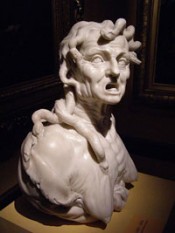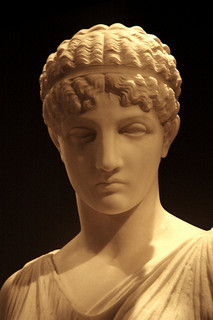Theme Essay by Ann Lightcap Bruno
Is Jealousy Ever Good for a Writer?
Last semester in my creative writing class, I asked eighteen high school students if one of them would share something they'd written. It was the final period of the day, right before spring break, and no one was biting.
Then from her seat in the corner, a quiet senior, who usually hid behind a curtain of lovely hair, raised her hand and said, “I’ll read mine.”
As we sat around the table in the drowsy, airless room, the girl’s essay jarred us into wakefulness. She described the searing, warped color of white light, then a dirty street, then a wrenching personal encounter, then numbness. Every word mattered. Though her voice was soft, I could feel her narrative vibrating like a jackhammer against my insides.
From their suddenly upright postures and rapt faces, I could tell the other students were as stunned as I was. When the girl finished, she looked up at us, her eyes apprehensive.
But no one could speak. Envy had rendered us mute.
In those moments of silence, I began to realize that the real sin of envy is how inarticulate we become when we feel it. Many literary depictions of envy refer to it as something we consume secretly, like a vial of poison. We’re embarrassed to share what we feel.
In A Theater of Envy, the critic Rene Girard calls envy “the hardest sin to acknowledge.” Indeed, I don’t like talking about my own envy. I’m ashamed of the ill will I occasionally bear women who enjoy what I don’t (pristine fingernails, spring vacations, children who dutifully practice piano). Worse, the cover of the New Yorker anthology 20 Under 40 can make me churn, even as I hit the “Add to Cart” button on Amazon.
At first glance, there’s nothing pretty about those feelings. Two millennia ago, Ovid personified the private viciousness of jealousy in a way that still feels uncomfortably familiar. In Metamorphoses, his hideous Envy—female, of course—chews on serpents’ flesh with rotten teeth and infects the maiden Aglauros with her venom. Once stung, Aglauros resents her sister’s perfect life, but it’s “a secret grief” she refuses to utter. In the end, she becomes a statue: bloodless, voiceless, and inhuman.
Poor Aglauros’s envy is marked by speechlessness. It’s the same inner pang I feel when some well-meaning person tells me the fun fact that Toni Morrison wrote her early novels in the hours after her children went to bed.
“What a great idea!” I might say through clenched teeth. And maybe at ten o’clock some night I sit at the kitchen table, toying with the prospect of writing, only to end up neck deep in rough-draft corrections of student essays about The Catcher in the Rye. “I don’t buy it, Toni Morrison” is the seething sentiment I dare not utter as I stagger up to bed.
And yet, some of these ugly feelings fuel me, too. They emerge when I read some beautiful student essay that I couldn’t have written, not in high school, not now, not ever—or when I teach The Sound and the Fury for the umpteenth time, struck anew by a raw-at-the-bone desire to weave something so magnificent.
What I would give to craft the dizzying wordplay of Vladimir Nabokov’s Lolita, the sparkling detail of Elizabeth Bishop’s “The Fish,” or the devastating ending of John Updike’s “Separating.” When I read the words Morrison wrote in the (supposedly) wee hours of the night as a 39-year-old single mother, I crave the ability to render the lyrical despair of The Bluest Eye’s Pecola and her Mary Jane candies and her marigolds. It only gets deeper with age, with rereading—this hunger for what I wish I could do.
So what if, in some brave, rare moment of found time, I go for it? I ignore the green-eyed, flesh-devouring monster and try to channel someone else’s talent and energy. I return to a listless scene in one of my stuck stories and conjure life into it by imagining myself as Morrison or Faulkner. I pretend to be one of the hip bespectacled faces on the New Yorker anthology cover in the hopes of writing a line as true as the grandmother’s “I hope you never love anything as much as I love you” from Jonathan Safran Foer’s Extremely Loud and Incredibly Close.
It’s not easy, neutralizing the venom inside my head. But when I do, the initial surge of envy can help me to understand what I love about another writer’s talent, allowing me to emulate the work I most admire. Through imitation, close study, even love, the desire to have what somebody else has may help us to create something worth reading.
Ovid may have depicted a monster, but Aristotle referred to envy as the close cousin of emulation. Unlike envy’s malignancy, the benign nature of emulation (in Greek, zēlos or zeal) allows us to convert our distress into a pursuit of greatness.
In practical terms, that means reading is an essential part of my writing process. To slap myself out of my tentative, predictable tendencies, I pick up a volume of something so good that it fills me with the requisite emulation to become unstuck. With any project I undertake, I try to break up my time at the keyboard with time in a soft chair, consuming the words of others without allowing my envy of them to turn me to stone.
That day in my creative writing class, after the silence following the student’s reading, there were a few mumbled wows. Then someone said, “I hate you!”
The girl grinned for the first time I could remember. The class bubbled to life, zealously echoing their fond “hate.”
“It’s so fucking good,” someone else said. “How the hell did you do that?”
We were engaged in a fabulous thing then, never mind the profanity. Just as the writer made herself vulnerable in sharing this intense, artful essay, the rest of my students also took risks in exposing their admiration. And everyone’s work (including my own) grew from the experience.
At the very heart of envy is desire—a force that ought to be at the heart of every human moment, ugly and beautiful, that we attempt to set down in words.
Publication Information
- A Theater of Envy: William Shakespeare by René Girard(originally published by Oxford University Press, 1991).
- The Metamorphoses of Ovid, translated by Allen Mandelbaum (Harvest/Harcourt Brace, 1993).
- The Bluest Eye by Toni Morrison (originally published by Holt, Rinehart, and Winston, 1970).
- Extremely Loud and Incredibly Close by Jonathan Safran Foer (Houghton Mifflin, 2005).
- On Rhetoric: A Theory of Civic Discourse by Aristotle, translated by George A. Kennedy (Oxford University Press, 1991).
Art Information
- “Giusto Le Court—Envy” © Andrzej Otrębski; Creative Commons license
- "Greek Statue" © Wonderlane; Creative Commons license
Ann Lightcap Bruno is an English teacher at the Wheeler School in Providence and lives in nearby Cranston, Rhode Island, with her husband and children.
Her essays and stories have appeared in such publications as Memoir (and), Painted Bride Quarterly, Mississippi Review Online, Talking Writing, and Alimentum.
"Perhaps writing is hard because of this fundamental ache, this desire to inscribe our very flesh—our eyelids, for God’s sake—with the story of our lives and the story of what we see around us, the story of the wide world and us in it." — "The Ache of Writing"



